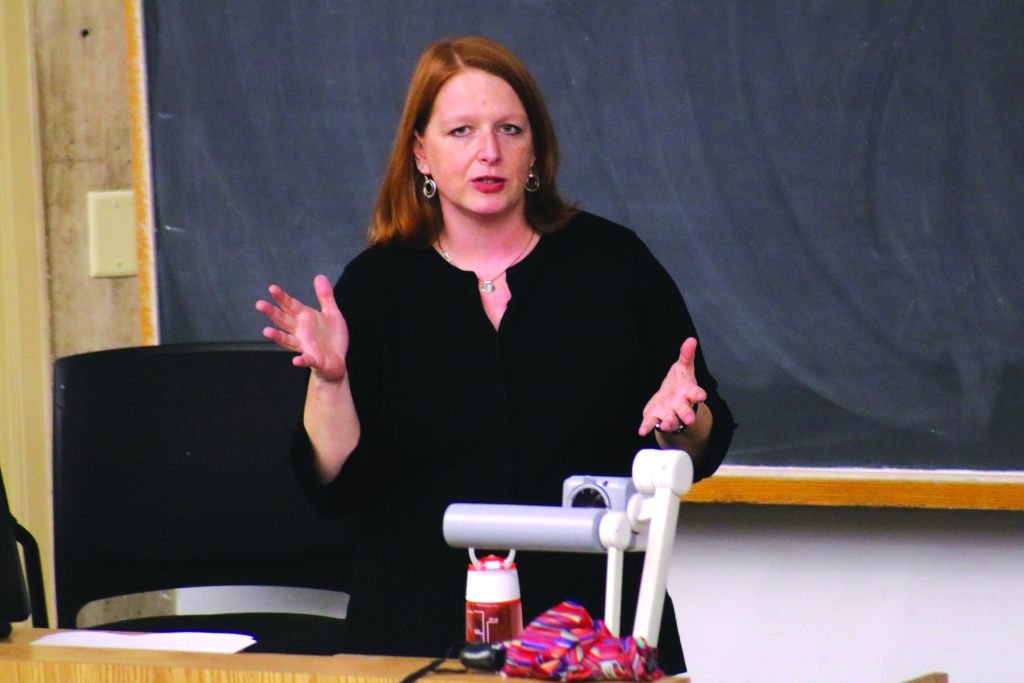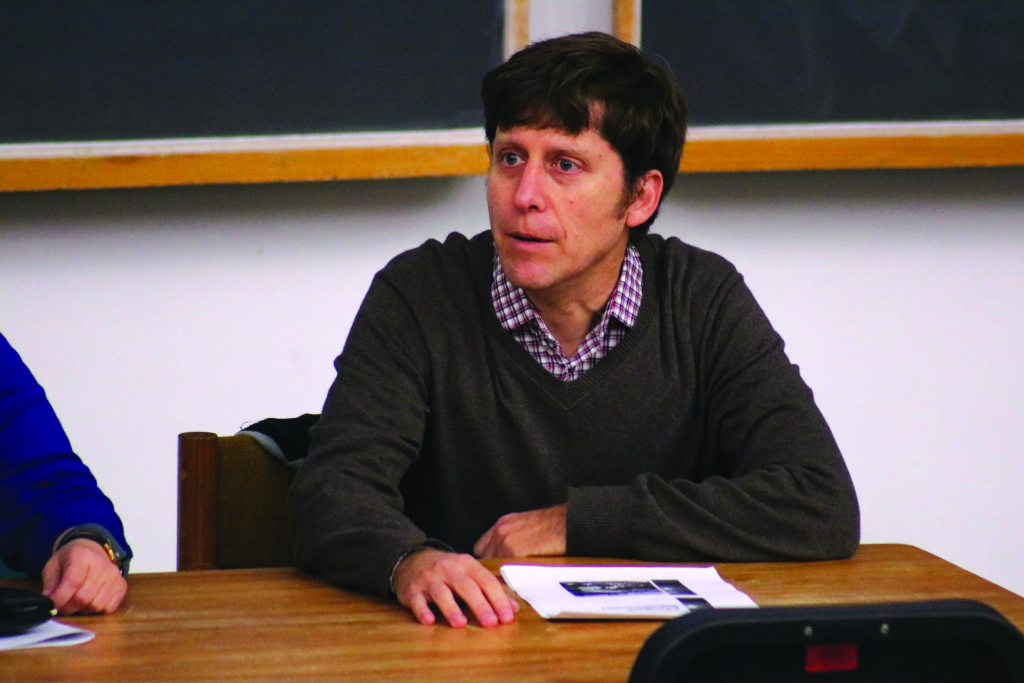
Photo by Kyle Vertin
COLIN PERRY
Assistant News Editor
What is ISIS? What do recent terror attacks have to do with World War II? And is there really an immigration crisis happening in Europe?
These questions and more were answered last Wednesday at “ISIS Terror in Europe: Perspectives on The Islamic State, Migration and Culture,” a panel discussion hosted by Fredonia faculty. Daniela Peterka-Benton of the Department of Sociocultural and Justice Systems organized the event, which also featured Jacqueline Swansinger from the Department of History and Alexander Caviedes from the Department of Politics and International Affairs. All three professors have studied and taught extensively on topics like terrorism, Islam and immigration.
Peterka-Benton first presented an overview of the recent Nov. 13 attacks in Paris and a brief history of ISIS, explaining that the group was first able to gain traction as a result of the withdrawal of American troops in Iraq. She also went on to say that the ISIS-aligned attackers in Paris were almost all European citizens.
“If you look at the jihadist networks in Europe, they really span throughout [the continent],” she said. “You will find radicals in those cells and groups in almost every country.”
Peterka-Benton was addressing one of the main points of the lecture, that many of the young men and women radicalized by ISIS are immigrants or come from immigrant families who are searching for, in her words, “a sense of belonging.” Many of their families originally came to European nations in guest worker programs after World War II, but stayed longer than anticipated, leading to hostile circumstances for immigrant groups throughout Europe.
Swansinger continued in that vein, lecturing extensively on the history of Islamic radicalism throughout Europe and the Middle East. According to her, groups like ISIS “cherrypick Islam to make their own philosophies,” and do not accurately reflect the views of all or even most Muslims.
At one point, Swansinger’s presentation turned to a slide titled, “‘Bombing the Sh!t Out of ‘em!’ A Good Idea?” She then illustrated a map of Syria in order to show that too many competing groups and interests persist in the area, turning to the conclusion that aggressive force would ultimately fail against radicalization.
“Unless there’s a coalition with the region, however the coalition is formed, the destruction of ISIS — maybe it’s a feel good moment, makes everybody feel like we did something. Other than that, it doesn’t change the future,” Swansinger said.
Caviedes presented last, turning the topic more toward immigration throughout Europe and arguing against the “crisis perception” perpetuated by the media and figures in the government.
“The media can spin a crisis and create a crisis,” Caviedes said.
According to him, immigration is the No. 1 political issue across all of Europe, yet statistics for immigration show that levels are decreasing in comparison to previous decades. Caviedes anticipates that immigration applications to Europe will reach one million before the end of the year, but pointed out that that figure is far from unprecedented. For example, after World War II, around 10 million people were relocated into Europe despite the difficult post-war conditions.

Photo by Kyle Vertin
A brief question-and-answer forum followed the panel discussion. Junior political science major Nick Beiling was one of many audience members who stayed for the entire discussion.
“I thought it’d be really interesting to see a professor’s take on the whole situation of ISIS,” said Beiling, “and to provide further context for the problems and their takes on how to solve [them].”
Peterka-Benton said she wanted to use the panel to clarify instances of misinformation or confusion she had seen in the media after the Paris attacks.
“One thing that really bothers me personally is this whole mixing of the debate about Syrian refugees and the terrorists,” she said. “While there is a connection, these are really two separate topics, and we should really handle them as such … I really felt like somebody needed to clarify these concepts, and what is the threat, or what could potentially be a threat.”
She described being “amazed” by the event’s big turnout, which she attributes to the complicated nature of many of the issues they discussed.
“It’s so multi-faceted,” she said. “There’s immigration, the refugees, and then you hear ISIS and the war in Syria, but then you have attacks in Europe – you’re almost overwhelmed, because it’s so complex.”
True to her word, near the end of the event one audience member asked whether a military strategy in the Middle East could succeed against ISIS.
The professors shook their heads.
“Europe certainly will have to face a lot of difficult questions,” said Peterka-Benton. “Questions about immigration control, questions about integration — how do you integrate newcomers into your country, how can this be done in a good way, what do you do with the ones that are already there? These things have never been addressed.”
